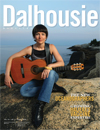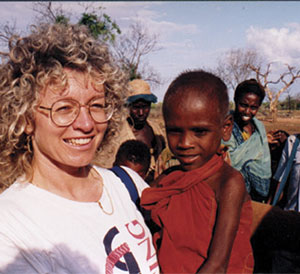 Dr. Joni Guptill (MD‚Äô81) peers out the¬† window of the UN World Food Program cargo plane as it roars toward the solitary airstrip in a remote section of South Sudan, Africa. The turbo-prop sweeps low, scaring away the cattle that wander along the strip threatening to thwart the pilot‚Äôs landing. On the ground, Dr. Guptill climbs into a truck and, for the next several hours, bounces along dusty trails that pass for roads on her way to an isolated village. At 47 C, the heat is almost unbearable; it feels like it‚Äôs blowing directly off a fire. Dr. Guptill is soaked in sweat. ‚ÄúLike being in hell,‚ÄĚ she thinks to herself.
Dr. Joni Guptill (MD‚Äô81) peers out the¬† window of the UN World Food Program cargo plane as it roars toward the solitary airstrip in a remote section of South Sudan, Africa. The turbo-prop sweeps low, scaring away the cattle that wander along the strip threatening to thwart the pilot‚Äôs landing. On the ground, Dr. Guptill climbs into a truck and, for the next several hours, bounces along dusty trails that pass for roads on her way to an isolated village. At 47 C, the heat is almost unbearable; it feels like it‚Äôs blowing directly off a fire. Dr. Guptill is soaked in sweat. ‚ÄúLike being in hell,‚ÄĚ she thinks to herself.South Sudan is struggling to rebuild itself after 20 years of brutal civil war. Two million people died; four million were displaced; 600,000 fled the country. Food is scarce. Real security is nonexistent. And, on this trip in 2006, there is a massive outbreak of meningitis. Dr. Guptill is here on an emergency mission with M√©d√®cins sans Fronti√®res (MSF)/Doctors Without Borders, Canada.
For three weeks, Dr. Guptill and a team of five ‚Äď two drivers, a logistician, two nurses and two Sudanese doctors ‚Äď work long, dusty days in suffocating heat, treating 858 cases of severe meningitis. In tiny outpost clinics, they care for extremely ill adults and children, and immunize many others.¬†
 |
| Dr. Joni Guptill in Somalia. |
‚ÄúIn South Sudan, we were helping people we knew were death-bound with meningitis,‚ÄĚ says Dr. Guptill, who recently became president of MSF Canada. ‚ÄúWhen you see a mother in a remote area who has end-stage meningitis and five children; and you know that treating her is going to save her and, consequently, help the survival of those children. . .well, that‚Äôs why we do it. Once you‚Äôve done a project like that, you know you‚Äôre doing the right thing.‚ÄĚ
From her first days as a medical student at Ľ∆…ę÷Ī≤•, Dr. Guptill wanted to work abroad. After graduation, she traveled through Africa to gain cross-cultural experience. In the early ‚Äô90s, while studying tropical medicine in London, England, she had an interview with MSF representatives. A year later, she was part of an MSF emergency team in Baidoa, Somalia, working amid a famine that was claiming up to 200 people daily.
By the time she returned to Canada, she was sold on MSF, an organization founded in 1971 by French doctors and medical journalists. Today, MSF is the world’s leading independent medical relief organization and a Nobel Peace Prize winner.
The Canadian arm of the organization was born in 1991. Dr. Guptill was instrumental in building its Atlantic chapter, which she ran out of her Halifax home for several years.
Dr. Guptill‚Äôs dedication spans more than two decades. She‚Äôs served five emergency missions ‚Äď in Turkey, Somalia, China, Syria/Iraq and South Sudan ‚Äď helping victims of famines, floods, war. (‚ÄúI‚Äôm lucky. I always go to these places that nobody else wants to go to,‚ÄĚ she says, sincerely.) As a peer support co-ordinator, she‚Äôs helped MSF members reintegrate into their Canadian lives after a mission, and she‚Äôs a passionate advocate on behalf of the organization.
As president of MSF Canada, Dr. Guptill faces a new kind of challenge. She assumes the volunteer position at a time of unprecedented violence against humanitarian aid workers. One recent report says that, in 2008, more aid workers were killed than UN peacekeepers. Being neutral and impartial no longer guarantees security. In 2004, MSF closed its programs in Afghanistan after five members were killed in an ambush. Three others were killed in Somalia; two in Pakistan. Last spring, a nurse was abducted ‚Äď and, later, safely released ‚Äď in Darfur.
‚ÄúWe‚Äôve changed many of our security policies. Ultimately, we have to decide whether or not to work in some contexts,‚ÄĚ says Dr. Guptill. ‚ÄúWe have to be comfortable sending someone to Afghanistan or Iraq or Somalia. We could just pull out of these contexts and yet, at the same time, this organization and its members feel very strongly that we want to be standing in solidarity with the people in the worst situations.‚ÄĚ
MSF refuses military escorts for its missions, fearing such protection might compromise their political neutrality and turn members into military targets. Even their best efforts, however, don‚Äôt always protect the organization from being snared by politics. Last March, after the International Criminal Court issued an arrest warrant for President Omar Al-Bashir, the Sudanese government kicked 28 MSF workers out of the country, leaving more than 100,000 people with no health care. The government claimed MSF provided information to the ICC ‚Äď a charge the organization denied unequivocally.
‚ÄúThe world is a complicated place,‚ÄĚ says Dr. Guptill. ‚ÄúHumanitarian aid is being more and more subjected to political decisions. But our work is with the remote peoples of the world who have no one to witness their need. That is our mandate. That is our mission. Our mission doesn‚Äôt change. Has it become more difficult? Yes. Are we mad? No. But we‚Äôre very sad we‚Äôve had to pull out of projects, as in Sudan.‚ÄĚ
It‚Äôs that realistic but dedicated outlook, combined with her experience, that makes Dr. Guptill so suited to lead MSF Canada. Ben Chapman, who attended Ľ∆…ę÷Ī≤• in the mid-1980s, is director of human resources for the group and has known Dr. Guptill for almost 18 years.
‚ÄúShe‚Äôs seen a lot of hot spots and some really difficult places as a medical doctor,‚ÄĚ he says. ‚ÄúBut she‚Äôs also seen the organization grow from nothing to a large, successful, national organization. She‚Äôs seen the evolution and she has a tremendous commitment.‚ÄĚ
Beyond the deep commitment, complexities and threats to their safety, something in Joni Guptill and other MSF members drives them to persevere; to return to the sick and hungry in what they call ‚Äėthe real world.‚Äô
‚ÄúWe bring hope to populations who think they are completely forgotten. Whether it‚Äôs taking supplies to physicians in Iraq who haven‚Äôt had contact with the outside community in years, helping mothers with severely malnourished children in a feeding centre in Somalia, or helping people in South Sudan who are suffering with meningitis. The hope we bring is a tangible thing,‚ÄĚ Dr. Guptill says. ‚ÄúAnd that‚Äôs what keeps us going back.‚ÄĚ
Vital statistics¬†‚ÄĘ Dr. Joni Guptill (MD ‚Äô81) is president of M√©d√®cins sans Fronti√®res (MSF)/Doctors Without Borders, Canada. |
